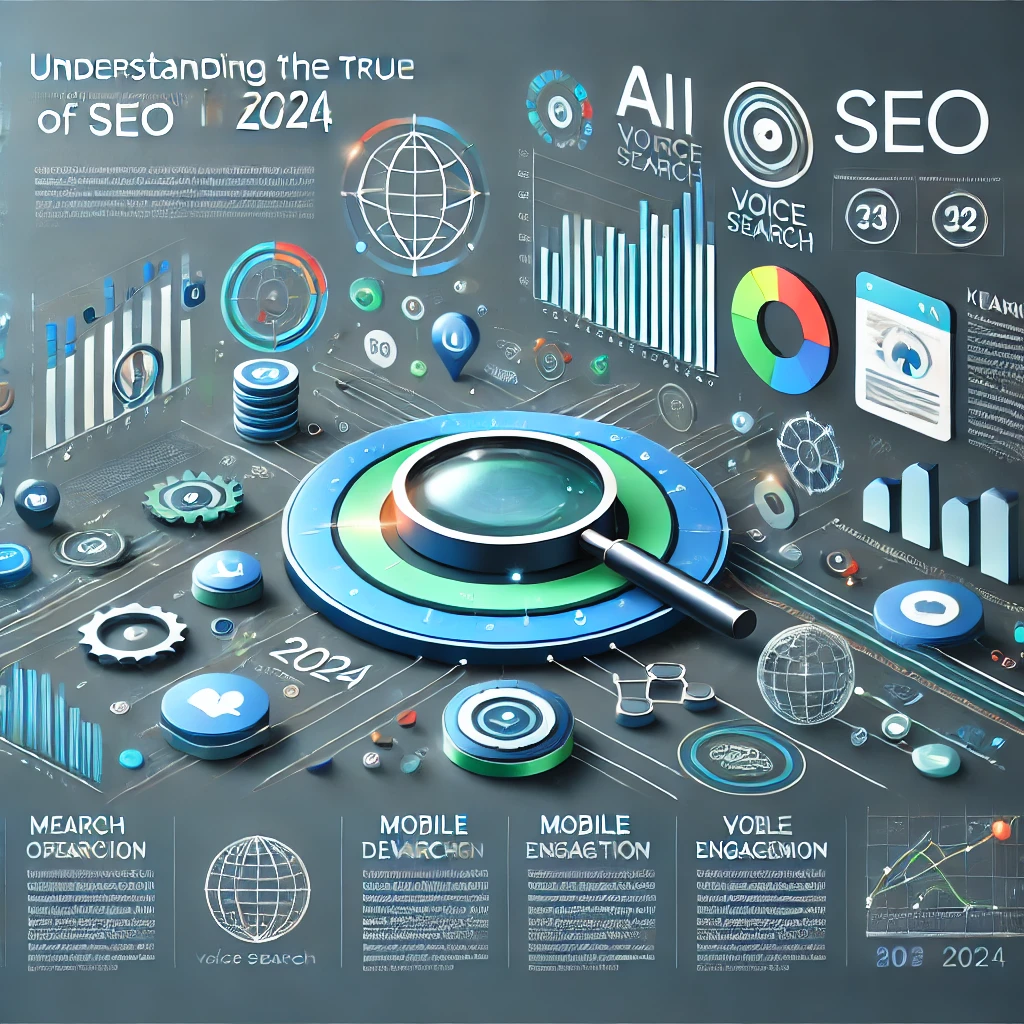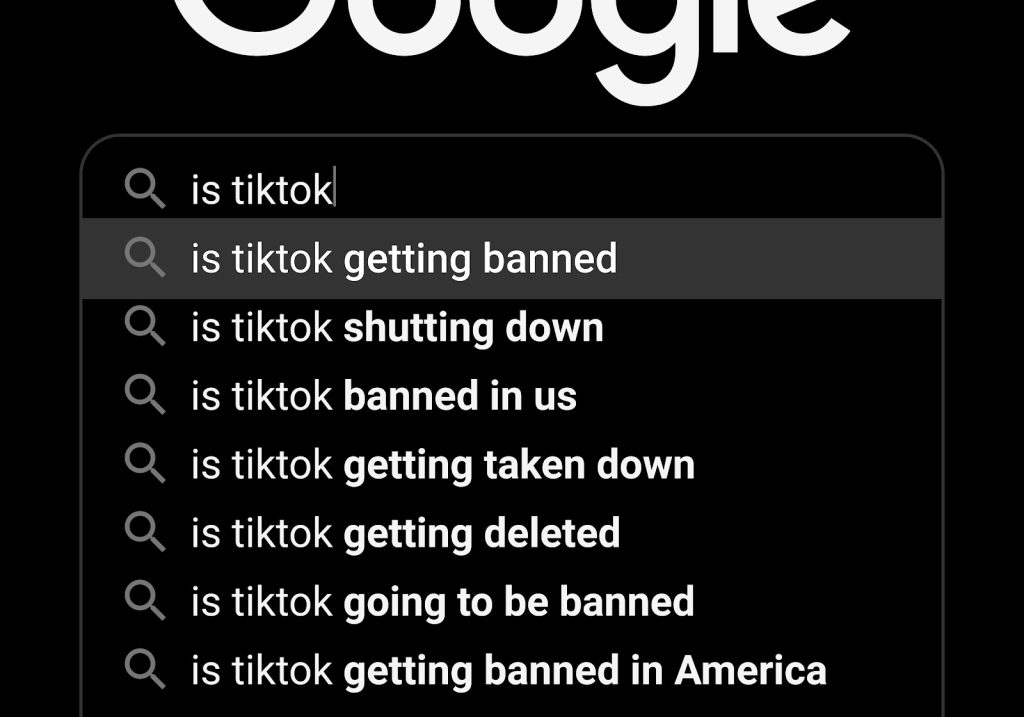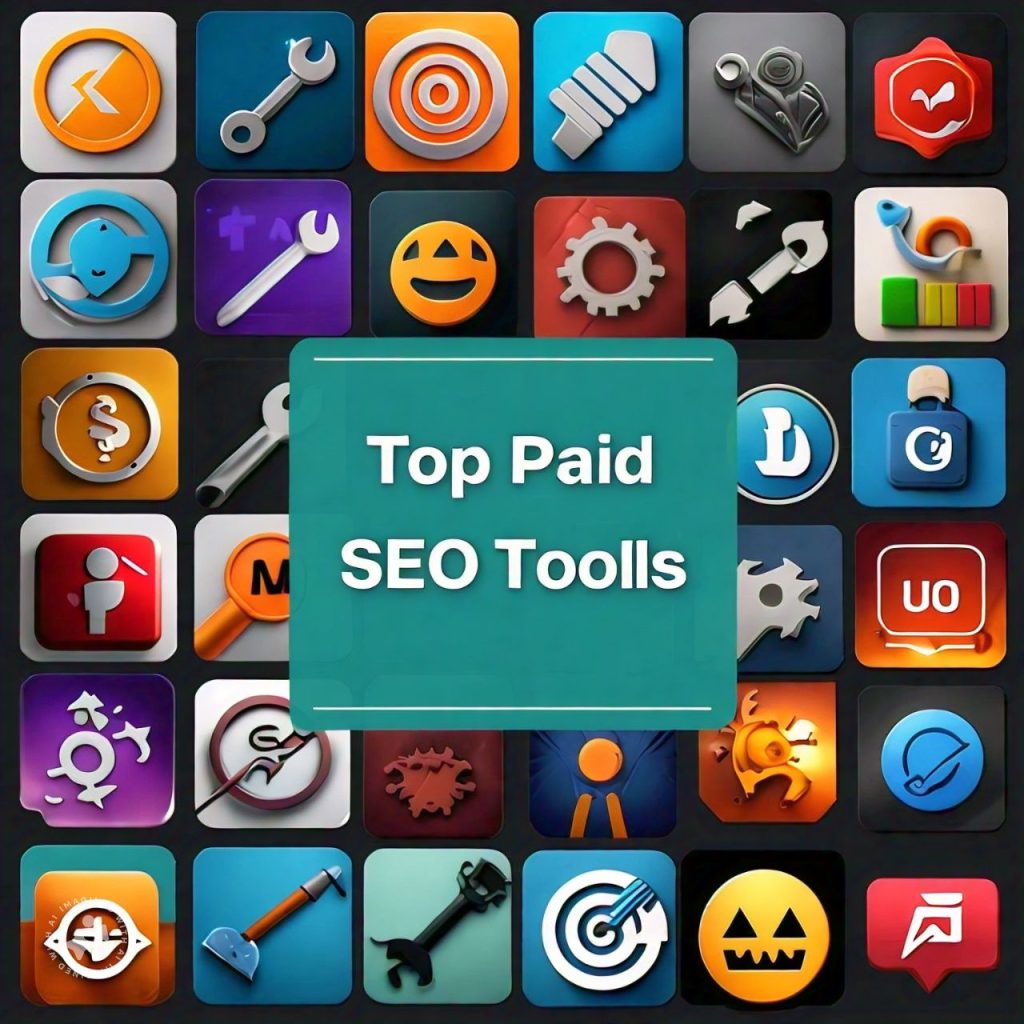Understanding the True Meaning of SEO in 2024
For businesses, being seen by the right audience can make all the difference. This is where Search Engine Optimization, or SEO, comes into play. But what does SEO mean in 2024?

The world of SEO is ever-evolving. As technology advances and user behavior changes, so does the definition of SEO. In 2024, understanding SEO is not just about knowing its acronym. It’s about recognizing its role in connecting businesses with their target audience. It’s about understanding how SEO practices and trends shape the digital marketing landscape.
And most importantly, it’s about knowing how to adapt to these changes. In this comprehensive guide, we delve into the true meaning of SEO in 2024. We explore its evolution, its core components, and the trends shaping its future. We also provide practical tips on how to adapt to these changes and improve your online visibility.
Whether you’re a digital marketer, an SEO specialist, a content creator, or a business owner, this guide is for you. So, let’s embark on this journey to understand the true meaning of SEO in 2024. Let’s learn how to navigate the ever-changing SEO landscape and stay ahead of the curve. Welcome to the future of SEO.
The Evolution of SEO: A Brief History
SEO has come a long way since its inception. In the early days, it was all about keyword stuffing and link farms.

But as search engines evolved, so did SEO. Google, the leading search engine, started rolling out algorithm updates to improve the quality of search results. These updates shifted the focus of SEO from quantity to quality. Keyword stuffing and shady link-building practices were no longer effective.
Instead, creating high-quality content and building natural, relevant links became the new norm. As technology advanced, new elements were added to the SEO mix. Mobile optimization, voice search, artificial intelligence, and user experience became crucial for SEO success.

And as we move into 2024, SEO continues to evolve, adapting to the latest technological advancements and changes in user behavior. Understanding this evolution is key to understanding the true meaning of SEO in 2024. It helps us appreciate the complexity of SEO and the importance of staying updated with the latest trends and practices. So, let’s delve deeper into the world of SEO and explore its true meaning in 2024.
What is SEO? Defining the Basics
SEO stands for Search Engine Optimization. It’s a digital marketing strategy focused on improving a website’s visibility in search engine results.

But SEO is more than just getting a website to rank high on search results. It’s about connecting businesses with their target audience in the most organic way possible. When done right, SEO can drive high-quality traffic to a website, increase conversions, and boost a brand’s online presence.
Here are the basic components of SEO:
- Keyword Research: This involves identifying the keywords that your target audience uses when searching for products or services similar to yours.
- On-Page SEO: This includes optimizing the content and HTML source code of a page. It involves using keywords in your content, meta tags, and URLs.
- Off-Page SEO: This involves activities that drive referral traffic to your website from other sites. It includes strategies like link building and social media marketing.
- Technical SEO: This involves optimizing the backend structure of your website for search engine crawling and indexing. It includes aspects like site speed, mobile-friendliness, and website security.
Understanding these basics is the first step towards understanding the true meaning of SEO in 2024. But as we’ll see in the next sections, SEO in 2024 is much more than these basics.
SEO Meaning 2024: How It’s Changed
The meaning of SEO in 2024 is not the same as it was a few years ago. SEO has evolved significantly, driven by advancements in technology and changes in user behavior.

In the early days, SEO was all about stuffing keywords into content and building as many backlinks as possible. But today, search engines like Google have become smarter. They now prioritize user experience and content quality over everything else. This shift has led to a change in the meaning of SEO.
Today, SEO is about understanding the intent behind a user’s search query and providing the most relevant and high-quality content to answer that query. It’s about optimizing not just for search engines, but also for users.
Here are some ways in which the meaning of SEO has changed in 2024:
- From Keywords to Topics: Instead of focusing on individual keywords, SEO now involves creating comprehensive content that covers a topic in-depth.
- From Quantity to Quality: In terms of backlinks, the focus has shifted from quantity to quality. Search engines now value high-quality, relevant backlinks more than a large number of low-quality ones.
- From Desktop to Mobile: With the rise of mobile devices, SEO has become more about optimizing for mobile users. This includes making websites mobile-friendly and improving page load times on mobile devices.
- From Global to Local: Local SEO has become more important than ever. Businesses now need to optimize their websites for local searches to attract local customers.
- From Text to Voice: With the rise of voice-activated devices like Google Home and Amazon Echo, SEO now involves optimizing for voice search.
- From Data to AI: Artificial intelligence and machine learning are now playing a significant role in SEO. They are being used to personalize search results and understand user intent better.
These changes reflect the evolving nature of SEO. They show that SEO is not a static field but a dynamic one that changes with time. Understanding these changes is crucial to understanding the true meaning of SEO in 2024. In the next sections, we’ll delve deeper into these changes and explore the core components of SEO in 2024.
SEO Explained: Core Components in 2024
SEO in 2024 is a multifaceted discipline. It’s no longer just about keywords and backlinks. It involves a wide range of strategies and techniques that aim to improve a website’s visibility in search engine results. These strategies and techniques can be broadly categorized into three core components: technical SEO, on-page SEO, and off-page SEO. Each of these components plays a crucial role in a successful SEO strategy. Let’s take a closer look at each of these components.
Technical SEO
Technical SEO involves optimizing the technical aspects of a website.

This includes improving site speed, ensuring mobile-friendliness, and making the site easy for search engines to crawl and index. In 2024, technical SEO has become more important than ever. This is because search engines like Google have started to place more emphasis on user experience. And the technical aspects of a website play a big role in determining user experience.
For instance, a slow-loading website can frustrate users and lead them to leave the site. This can increase the site’s bounce rate and negatively impact its search engine rankings. Similarly, a website that is not mobile-friendly can provide a poor user experience for mobile users. This can also lead to a higher bounce rate and lower rankings. Therefore, optimizing the technical aspects of a website is a crucial part of SEO in 2024.
On-Page SEO
On-page SEO involves optimizing the content and HTML source code of a page.

This includes using relevant keywords in the content, creating high-quality content, and optimizing title tags and meta descriptions. In 2024, on-page SEO is not just about using the right keywords. It’s also about understanding user intent and creating content that provides value to the user.
For instance, if a user is searching for “how to bake a cake,” they are likely looking for a step-by-step guide on baking a cake. So, creating a detailed guide that provides clear and easy-to-follow instructions can help improve the page’s search engine rankings. On-page SEO also involves optimizing the HTML source code of a page.
This includes using relevant title tags and meta descriptions that accurately describe the content of the page. These elements can help search engines understand what the page is about and can also improve the page’s click-through rate from search engine results.
Off-Page SEO
Off-page SEO involves activities that are performed outside the boundaries of a website.

This includes building high-quality backlinks, social media marketing, and influencer marketing. In 2024, off-page SEO is about building a strong online reputation and authority. This can be achieved by getting high-quality, relevant backlinks from authoritative websites. Social media marketing and influencer marketing can also help improve a website’s online reputation and authority.
These strategies can help increase brand visibility, drive traffic to the website, and improve search engine rankings. In conclusion, SEO in 2024 involves a combination of technical SEO, on-page SEO, and off-page SEO. Understanding and implementing these core components is key to achieving SEO success in 2024.
SEO Trends 2024: What’s New and What’s Next
The world of SEO is constantly evolving.

New trends emerge, old ones fade away, and some continue to hold their ground. In 2024, several key trends are shaping the SEO landscape. These trends reflect the ongoing advancements in technology and changes in user behavior. They also highlight the increasing focus on user experience and content quality.
In this section, we will explore four major SEO trends in 2024: voice search optimization, AI and machine learning, mobile-first indexing and UX, and E-A-T and content quality. Understanding these trends can help you stay ahead of the curve and adapt your SEO strategies accordingly.
Voice Search Optimization
Voice search is not a new trend.

But it has gained significant momentum in recent years. With the increasing adoption of smart speakers and voice-activated devices, more and more people are using voice search. In fact, it is estimated that by 2024, 50% of all searches will be voice searches. This has significant implications for SEO. For one, voice search queries are typically longer and more conversational than text-based queries.
This means that long-tail keywords and natural language are becoming more important for SEO. Also, voice search results often come from featured snippets. So, optimizing your content for featured snippets can help improve your visibility in voice search results. In conclusion, voice search optimization is a key SEO trend in 2024 that you cannot afford to ignore.
AI and Machine Learning
Artificial intelligence (AI) and machine learning are playing a significant role in SEO in 2024.
Search engines are using AI and machine learning to better understand user intent and deliver more personalized search results. For instance, Google’s RankBrain uses machine learning to interpret complex, multi-word queries and provide relevant search results. AI and machine learning are also being used in SEO tools to analyze data, identify trends, and provide insights.
This can help you make more informed decisions and improve your SEO strategies. In conclusion, AI and machine learning are not just buzzwords. They are key trends that are shaping the future of SEO.
Mobile-First Indexing and UX
Mobile-first indexing is a standard practice in 2024.

This means that Google predominantly uses the mobile version of a website for indexing and ranking. So, if your website is not mobile-friendly, it can negatively impact your search engine rankings. But mobile-first indexing is not just about having a mobile-friendly website.
It’s also about providing a great user experience on mobile devices. This includes having a responsive design, fast loading times, and easy navigation. In conclusion, mobile-first indexing and UX are crucial for SEO success in 2024.
E-A-T and Content Quality
E-A-T stands for Expertise, Authoritativeness, and Trustworthiness.

It’s a concept that Google uses to assess the quality of a website and its content. In 2024, E-A-T is more relevant than ever. This is because Google has made several updates to its algorithm to prioritize high-quality, trustworthy content.
So, if you want to improve your search engine rankings, you need to focus on creating high-quality content that demonstrates your expertise and authority in your field. You also need to build trust with your audience by being transparent and honest. In conclusion, E-A-T and content quality are key factors for SEO success in 2024.
How to Adapt to SEO Changes in 2024
The SEO landscape is constantly changing.

To stay competitive, you need to adapt to these changes. But how do you do that? In this section, we will discuss three key strategies: embracing AI for SEO, prioritizing user experience (UX), and building for semantic search and structured data. These strategies can help you navigate the SEO landscape in 2024 and beyond.
Embracing AI for SEO
Artificial intelligence (AI) is no longer a futuristic concept. It’s here, and it’s transforming SEO. Search engines are using AI to understand user intent and deliver personalized search results. SEO tools are using AI to analyze data and provide insights. So, if you want to stay ahead in the SEO game, you need to embrace AI. But how do you do that?
Here are a few tips:
- Use AI-powered SEO tools to analyze data and identify trends.
- Optimize your content for AI-driven search features like voice search and visual search.
- Use AI to personalize your content and provide a better user experience.
- Stay updated with the latest developments in AI and machine learning.
In conclusion, embracing AI can help you improve your SEO strategies and stay competitive in 2024.

Prioritizing User Experience (UX)
User experience (UX) is a critical factor for SEO in 2024. Search engines are prioritizing websites that provide a great user experience. This includes factors like page speed, mobile-friendliness, and easy navigation. So, if you want to improve your search engine rankings, you need to prioritize UX. But how do you do that?
Here are a few tips:
- Make sure your website loads quickly.
- Ensure your website is mobile-friendly.
- Make your website easy to navigate.
- Provide high-quality, relevant content that meets user needs.
In conclusion, prioritizing UX can help you improve your SEO performance and provide a better experience for your users.
Building for Semantic Search and Structured Data
Semantic search and structured data are key components of SEO in 2024.

Semantic search is about understanding the context and intent behind search queries. Structured data, on the other hand, helps search engines understand and display your content. So, if you want to improve your visibility in search results, you need to build for semantic search and structured data. But how do you do that?
Here are a few tips:
- Use natural language and long-tail keywords to optimize for semantic search.
- Use structured data markup to enhance your search results.
- Create comprehensive, in-depth content that covers a topic thoroughly.
- Stay updated with the latest developments in semantic search and structured data.
In conclusion, building for semantic search and structured data can help you improve your SEO performance and visibility in 2024.
SEO Tools and Technologies in 2024
The SEO landscape in 2024 is more complex than ever. To navigate this landscape, you need the right tools and technologies. These tools can help you analyze data, identify trends, and make informed decisions. They can also help you stay ahead of the competition and achieve your SEO goals.
But what are these tools and technologies? Let’s take a closer look. First, we have SEO analytics tools. These tools can help you track your performance, identify opportunities, and measure your success. Examples include Google Analytics, SEMrush, and Ahrefs. Next, we have keyword research tools.
These tools can help you find the right keywords for your content. Examples include Google Keyword Planner, Moz Keyword Explorer, and Ubersuggest. Then, we have technical SEO tools. These tools can help you identify and fix technical issues on your website. Examples include Screaming Frog, DeepCrawl, and Google Search Console.

We also have content optimization tools. These tools can help you optimize your content for search engines. Examples include Yoast SEO, Surfer SEO, and Clearscope. Finally, we have link building tools. These tools can help you build high-quality backlinks to your website. Examples include BuzzSumo, Majestic SEO, and LinkResearchTools.
In addition to these tools, there are also several technologies that are shaping the SEO landscape in 2024. These include artificial intelligence, machine learning, and natural language processing. These technologies are helping search engines understand user intent and deliver personalized search results.
They are also helping SEO professionals analyze data and provide insights. In conclusion, the right tools and technologies can help you navigate the SEO landscape in 2024 and achieve your SEO goals. So, make sure you invest in these tools and stay updated with the latest technologies.
Measuring SEO Success: KPIs and Metrics
SEO success in 2024 is not just about ranking high on search engine results pages (SERPs).

It’s about achieving your business goals and providing value to your audience. But how do you measure SEO success? You do it by tracking key performance indicators (KPIs) and metrics. Let’s explore some of the most important ones. First, we have organic traffic. This is the number of visitors who come to your website through organic search.
It’s a key indicator of your SEO performance. Next, we have keyword rankings. This is where your website ranks on SERPs for specific keywords. While not the only measure of success, it’s still an important metric to track. Then, we have click-through rate (CTR). This is the percentage of people who click on your website after seeing it in search results.
A high CTR indicates that your title tags and meta descriptions are effective. We also have bounce rate. This is the percentage of visitors who leave your website after viewing only one page. A high bounce rate may indicate that your content is not meeting user expectations.
Finally, we have conversions. This is the number of visitors who take a desired action on your website, such as making a purchase or filling out a form. Conversions are the ultimate measure of SEO success. In addition to these KPIs and metrics, there are also several others that you can track. These include page load time, pages per session, and time on site.
These metrics can provide insights into user behavior and website performance. In conclusion, measuring SEO success involves tracking a variety of KPIs and metrics. These KPIs and metrics can provide valuable insights into your SEO performance and help you make informed decisions. So, make sure you track them regularly and use them to guide your SEO strategy.
SEO Myths and Misconceptions to Leave Behind
As we navigate the SEO landscape in 2024, it’s crucial to separate fact from fiction.

There are several myths and misconceptions about SEO that can hinder your progress. Let’s debunk some of them. First, the myth that “SEO is a one-time task.” SEO is an ongoing process. Search engine algorithms are constantly evolving, and so should your SEO strategy. Next, the misconception that “more backlinks mean better SEO.” Quality matters more than quantity when it comes to backlinks.
A few high-quality backlinks can be more beneficial than numerous low-quality ones. Then, there’s the myth that “keyword stuffing improves rankings.” This is not true. In fact, keyword stuffing can lead to penalties from search engines. It’s better to focus on creating valuable content that naturally includes your target keywords.
Another common misconception is that “SEO is all about rankings.” While rankings are important, they’re not the only measure of SEO success. Traffic, engagement, and conversions are also crucial factors to consider. Finally, there’s the myth that “social media doesn’t affect SEO.”
While social media signals may not directly impact search rankings, they can enhance your online visibility and drive traffic to your website. In conclusion, it’s important to stay informed and avoid falling for these common SEO myths and misconceptions. By doing so, you can focus on what truly matters and achieve better results with your SEO efforts.
Conclusion: The Future of SEO
As we look ahead, the future of SEO appears more dynamic than ever.

The year 2024 has brought significant changes, and more are on the horizon. SEO is no longer just about keywords and backlinks. It’s about creating a seamless user experience. It’s about understanding and adapting to the latest technology trends. Artificial intelligence, voice search, and mobile-first indexing are just a few examples.
The importance of E-A-T (Expertise, Authoritativeness, Trustworthiness) continues to grow. Content quality and credibility are more crucial than ever. SEO is also becoming more personalized. Search engines are getting better at understanding user intent. They’re delivering more personalized and relevant search results.
This means SEO strategies need to be more user-focused. In the end, the true meaning of SEO in 2024 is about connecting with your audience. It’s about providing value and building trust. And as SEO continues to evolve, so should our understanding and approach. The future of SEO is here, and it’s more exciting than ever.
Appendix: 100 Key Takeaways for SEO in 2024
- SEO stands for Search Engine Optimization, a strategy to improve website visibility.
- In 2024, SEO continues to evolve with technology and user behavior changes.
- SEO’s role is to connect businesses with their target audience through organic search.
- Google algorithm updates in 2024 prioritize user experience and content quality.
- Voice search optimization is increasingly important with the rise of smart speakers.
- Artificial intelligence personalizes search results and understands user intent.
- Mobile-first indexing is standard, making mobile optimization crucial for SEO.
- E-A-T (Expertise, Authoritativeness, Trustworthiness) establishes content credibility.
- Local SEO is key for businesses to attract local customers.
- Semantic search and natural language processing deliver more accurate results.
- Structured data markup enhances SERP features and helps search engines understand content.
- Backlink strategies focus on building natural, relevant links.
- SEO tools are essential for analyzing performance and identifying opportunities.
- Page speed and Core Web Vitals affect user experience and site performance.
- SERP features like featured snippets offer additional ways to gain visibility.
- Video SEO is on the rise with video content becoming a significant part of users’ search habits.
- Omnichannel SEO strategies integrate various digital platforms for a cohesive brand experience.
- Personalization in SEO tailors content to individual user preferences.
- Social media signals integrated into SEO strategies enhance brand visibility.
- Content optimization focuses on comprehensiveness, readability, and value to the user.
- Predictive search and anticipatory design shape SEO strategies.
- Cybersecurity and secure websites (HTTPS) are crucial in SEO.
- User-generated content, such as reviews, contributes to SEO.
- Visual search technology requires optimization of images for better visibility.
- Sustainability and ethical practices influence SEO through consumer search behavior.
- Influencer marketing in SEO helps build brand authority and backlinks.
- Privacy regulations impact SEO practices, particularly in data collection.
- Long-form content that provides in-depth information is favored.
- Podcasts and audio content are part of an SEO strategy to reach a broader audience.
- Balance between automation in SEO and the need for human creativity is necessary.
- Continuous learning and staying updated with SEO best practices is important.
- International SEO is potential for businesses looking to expand their reach.
- Managing how a brand appears in search results is significant.
- A/B testing refines SEO strategies and improves content performance.
- Customer experience plays a role in SEO, as search engines aim to provide the best results.
- SEO integrates with other marketing channels, such as email marketing.
- Transparency and honesty in SEO practices build trust with users.
- Adaptability in SEO strategies is needed to respond to changes in the digital landscape.
- Global events influence search trends and require SEO strategies to be agile.
- Blockchain technology impacts SEO through decentralized content verification.
- A strong brand presence on social media can indirectly affect SEO.
- Content clusters and topic authority establish a website’s expertise.
- Interactive content engages users and increases time spent on the page.
- Zero-click searches trend requires optimization for providing quick answers.
- Data-driven decision-making in SEO identifies trends and measures success.
- Ethical link-building practices maintain the integrity of a website’s backlink profile.
- Digital accessibility ensures content is accessible to all users.
- A content calendar is important in planning a consistent SEO content strategy.
- Public relations leverage media coverage to improve brand visibility.
- Cross-device compatibility is necessary in SEO, as users switch between devices.
- A well-structured website hierarchy improves user navigation and search engine crawling.
- Augmented reality (AR) and virtual reality (VR) content could become part of SEO strategies.
- Understanding the search intent behind keywords is important to create relevant content.
- Customer feedback and surveys shape SEO strategies and content creation.
- Server location and hosting impact website speed and SEO performance.
- Heatmaps and user behavior analytics improve website design and user experience.
- A responsive design that adapts to different screen sizes and resolutions is important.
- Content freshness in SEO requires regular updates to maintain relevance.
- AI-generated content can complement human-written content in SEO strategies.
- A multi-language website is important for businesses targeting a global audience.
- Social listening informs SEO content strategies by understanding audience needs.
- Aligning SEO goals with business objectives creates a cohesive digital marketing strategy.
- Conversion rate optimization (CRO) in SEO ensures that traffic leads to desired actions.
- Social sharing increases visibility and backlinks, impacting SEO.
- A clear and compelling meta description improves click-through rates from SERPs.
- FAQs and how-to guides provide direct answers


